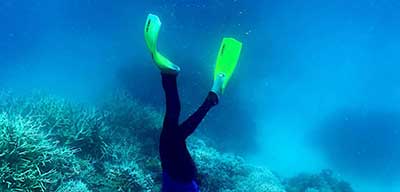Relevance: GS-3: Conservation, Environmental Pollution and Degradation; Awareness in the fields of Biotechnology
Key Phrases: Coral Bleaching, Coral Reefs, underwater tropical rainforest, Biorock Technology, International Coral Reef Initiative, Coral Triangle , Great Barrier Reef, Polyps, Zooxanthellae, Symbiotic Relation.
Why in News?
- The Australian government Agency has cautioned that the Great Barrier
Reef is suffering widespread and severe coral bleaching
- This is due to high ocean temperatures.
- The region also witnessed a mass bleaching event 2 years ago.
Key highlights
- Great Barrier Reef, world’s largest coral reef ecosystem, is a UNESCO
World Heritage Site
- A United Nations delegation is due to assess whether the reef's World Heritage listing should be downgraded due to the ravages of climate change.
What is the Great Barrier Reef?
- It is a region east to the Australian continent (State of Queensland), about the size of Japan which is world’s largest coral Reef Ecosystem.
- It houses more than 600 types of corals and 1600 species of fish.
- It is of great ecological importance to the world and of great significance to Australia from an Ecotourism point of view. It also has significant importance from the point of view of Blue Economy.
What is the importance of Coral Reefs?

- Natural barrier to adversities like Cyclone, Coastal erosion etc.
- Importance in Marine Ecosystem
- Coral reefs act as breeding, spawning, nesting and feeding areas for many fishes and other marine organisms
- Source of food
- It has been assessed that one square kilometre of coral reef produces 20-35 mega tonnes of fishes sufficient to feed about 600 people annually.
- Ecotourism
- Medicinal Benefits : novel drugs especially in Oncology are derived from these reefs
- Suitable weather pattern : IMD study has held coral reef to be important for Indian monsoon
Status of Coral Reefs in India and the world
- India has 4 coral reef areas:
- Gulf of Mannar,
- Andaman and Nicobar Islands,
- Lakshadweep islands and
- The Gulf of Kutch
- Indonesia has the largest coral reef area in the world.
- As many as 10% of coral reefs have degraded; another 30% are likely to disappear within next 20 years across the globe.
- The damage and severity of bleaching will depend upon weather patterns over the next few weeks.
- Bleaching has been detected across the Marine Park — it is
widespread but variable, across multiple regions, ranging in impact from
minor to severe.
- When the ocean water becomes too warm, the corals bleach as the symbiotic algae (Zooxanthellae) leave them.
- If the bleaching continues, its growth is obstructed or it eventually dies.
- Unusually warm ocean temperatures in 2016, 2017 and 2020 caused mass
bleaching
- The previous bleaching damaged two-thirds of the coral.
- As per Greenpeace the severe and widespread coral bleaching was
suffered during a La Niña weather pattern.
- This is a concern because this weather pattern is associated with cooler Pacific Ocean temperatures.
- This is evidence of the Australian government’s failure to protect the coral from the impacts of climate change.
- This is a sure sign that climate change caused by burning coal, oil and gas is threatening the very existence of marine ecosystems
Troubles for the status as WHS (World Heritage Site)
- In July last year, Australia garnered enough international support to defer an attempt by UNESCO, the United Nations’ cultural organisation, to downgrade the reef’s World Heritage status to “in danger“ because of damage caused by climate change.
- This could change in the meeting supposed to be held in June next
year.
- Which would be based on the inspection carried out by the UN delegation in coming week.
Can UNESCO remove the tag of WHS from a site?
- UNESCO’s WHS tag has importance from cultural (heritage) as well as economics (tourism) point of view. They are regarded as important “to all the peoples of the world, irrespective of the territory on which they are located".
- But due to the dangers faced to their maintenance, the meeting of World Heritage Committee can decide to put those sites on the list of World Heritage in Danger.
- The most recent site to be removed from UNESCO's World Heritage List is Liverpool Maritime Mercantile City in Liverpool
Steps to Safeguard Corals
India
- Legislation - Coastal Zone Regulation 1991 imparts maximum protection to Coral Reefs by classifying them under CRZ-1 category of laws
- Executive Authority - Ministry of Environment, Forest and Climate Change (MoEFCC) and States’ Environment Department will be responsible for providing protection to Coral reefs under protected areas
- Research and Development
- Biorock Technology - a low current is passed for faster accumulation of Calcium Carbonate to quicken the process of creation of Coral Skeleton
- Zoological Survey of India along with Gujarat Government is working to install such structure in Gulf of Kutch
World
- International Coral Reef Initiative (ICRI)
- It is an informal partnership between Nations and organisations which strives to preserve coral reefs and related ecosystems around the world.
- It was launched at the United Nations Global Conference on Sustainable Development of Small Islands Developing States in Barbados in 1994.
- ICRI had declared 2018 as the third International Year of the Reef (IYOR)
- UNEP’s Coral Reef Unit (CRU) was established in 2000
- Coral Triangle initiative
- Coral Triangle is spread over 6 countries (CT6) of – Indonesia, Malaysia, Papua New Guinea, the Philippines, the Solomon Islands and Timor Leste.
- It occupies only 1.5% of the world’s total ocean area, but represents 30% of the world’s coral reefs.
Conclusion
- Coral Reefs are called the underwater tropical rainforest. Their conservation must form an important part of adaptation measures as most of the threats faced by them are anthropogenic in origin. Also, their destruction will impact human lives ecologically, economically and culturally.
Source: The Hindu
Mains Question:
Q. Comment on the status of The Great Barrier Reef? How is it important to humans and what are the challenges faced by it?



















